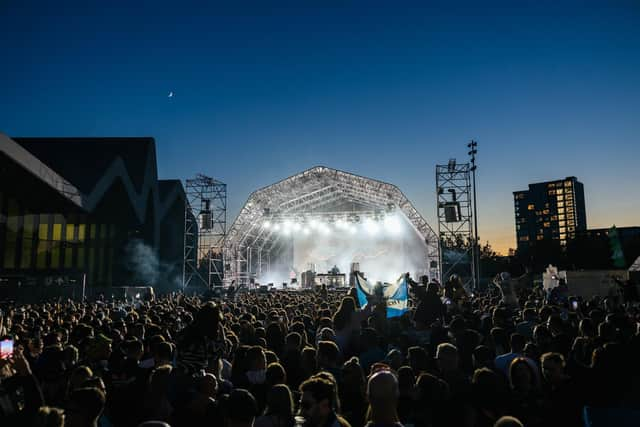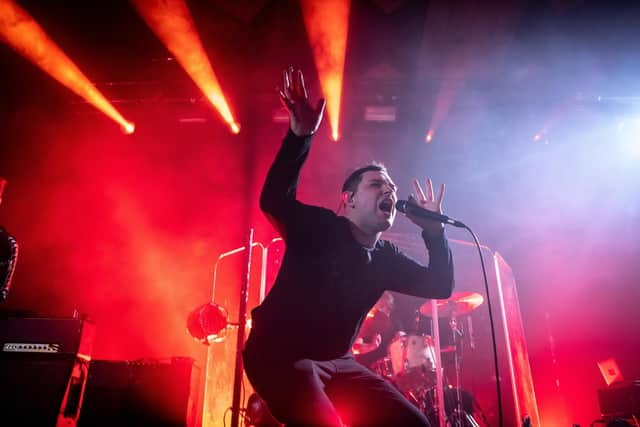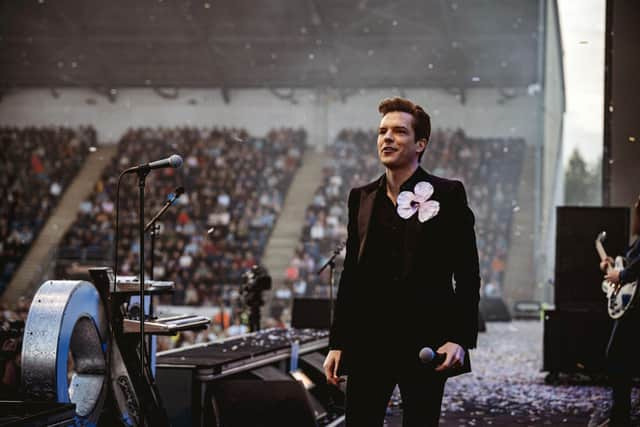How Covid has impacted Scotland's music scene - Dani Garavelli
Then, suddenly: a blaze of lights, a rolling synth, and the band was there, playing 10 Good Reasons For Modern Drugs to a crowd crying out for communal catharsis. Lead singer James Graham hurled himself across the stage, like a man both tormented and exalted, and the faithful responded; secular charismatics, unleashing two years’ of grief and frustration into the heady, sweaty air.
Between songs, Graham looked out onto tear-streaked faces. “It was humbling to see what it meant to people,” he says. “I could feel the release it gave them; the same release it was giving me.
Advertisement
Hide AdAdvertisement
Hide Ad“I am a very anxious person - in the past I would be anxious before, during and after the gig. But this time the anxiety disappeared, because we have all been through so much, and it felt like a miracle it was happening at all.”


For his fans, it was a quasi-religious experience, all the more heightened for being so long-awaited. The Twilight Sad concert, which was supposed to take place in April 2020, had been rescheduled then cancelled multiple times.
The same was true of many concerts. But this one had become freighted with significance, as if symbolic of all the live performances lost to the pandemic.
“Their music is dark, but there’s hope in that darkness. I think it resonated,” says Alan Bell who has seen them play many times. So, too, did the title of their last album: It Won/t Be Like This All The Time. Those words, and Graham's voice, thrummed like a prayer in my own head during the bleakest periods of lockdown. The Barrowlands gig felt like a prophecy fulfilled; a promise kept.
*********


Music was a lifeline for many people during Covid-19. You could see that in the growth of virtual events, such as Tim Burgess’s Twitter Listening Parties and Zoom gigs. Unable to go out, people sought new forms of collective consumption. Amongst some demographics, it fed into the vinyl revival, too, with gig-goers spending freed-up cash on new releases and reissues, then sharing details of their purchases on social media.
During the pandemic, independent label Last Night From Glasgow saw record sales turnover rise by 300 per cent. Founded by Ian Smith, in 2016, LNFG had been run on a voluntary basis. Now, it employs four people including Smith and his wife, Julia.
Of course, those who had sought solace in new (and old) music were keen to hear it performed live as soon as lockdown was eased. When Mogwai played Glasgow's Royal Concert Hall in November, it was to an audience which had helped send their album As The Love Continues to the top of the charts. It was the first time the band had hit the Number One spot. Their achievement was the source of online celebrations at a time when there was little to be happy about.
“We had already played a couple of gigs in France, but it felt really special to be back in front of a home crowd,” says Mogwai guitarist Stuart Braithwaite. “As The Love Continues came out at a time no-one was allowed out of their houses so it was lovely to have that personal connection; to be finally playing those songs in a room full of the people who had been listening to them.”


Advertisement
Hide AdAdvertisement
Hide AdArtists, too, missed the thrill (not to mention the revenue) of performing live. In late 2020, Deacon Blue did a pre-record for the BBC’s Hogmanay show. "It was horrible. Just us and some cameras and we had to stand 6ft apart," says lead singer Ricky Ross. The following year, the band was forced to cancel concerts in Aberdeen and Glasgow as Omicron took hold in the run-up to Christmas.
Those gigs were finally held in May. “Aberdeen was great, but it was the concert at the Hydro that felt really special,” Ross says. “It coincided with the week where restrictions were lifted and people were no longer required to wear masks, so everyone was relaxed. You could feel a wave of joy from people saying: 'We are here. We are finally back’.”
The euphoria has been unmistakable. And yet, it is perhaps misleading. Despite the initial adrenaline rush, the live music scene across the UK remains precarious, especially for smaller or less established bands. While big names like Blondie and The Pet Shop Boys have continued to attract large crowds to roll-over gigs, and The Killers played a second night in Falkirk to satisfy demand, many musicians are reporting a significant number of no-shows at rescheduled events.
“It may be that people have caught Covid or are still cautious about catching Covid or have forgotten they bought tickets or have a clash of dates,” says musician Bobby Bluebell who has experienced the phenomenon first-hand.
Other bands are struggling to sell tickets for new concerts. Last week, Ticketmaster held a flash sale offering two-for-one deals on a large number of live events including Bryan Adams, Duran Duran and Diana Ross.
Likewise, summer 2022 was supposed to be a daisy chain of loved-up music festivals. Yet as we head towards the longest day, ticket sales appear to be flagging. While the biggest events, such as Glastonbury (rolled over from 2020) Reading and Leeds, continue to flourish, others such as Riverside in Glasgow, are reportedly less busy than before, while a handful, including This is Tomorrow in Newcastle, Brainchild in East Sussex, and Breakout in Kirkcaldy, have been cancelled.
A confluence of factors is to blame. The continued grip of Covid, the logjam created by rescheduled gigs and the cost of living crisis are combining to create a fragile ecosystem in which consumers are reluctant to commit.
When I speak to Mark Mackie, CEO of Regular Music, he is gearing up for a run of three sell-out Del Amitri concerts at the Barrowlands, the first of which is a free show for NHS workers.
Advertisement
Hide AdAdvertisement
Hide AdHe says tickets are also selling well for Primal Scream at Glasgow's Queens Park, and Deacon Blue, Texas, Elbow and The Script at Edinburgh Castle, while most of the bands who signed up for Summer Nights at the Bandstand in Kelvingrove Park, Glasgow, two years ago have been able to make the rescheduled shows. Still, he warns of rocky years ahead.
“The good news is that - despite our fears - most of the venues have survived,” Mackie says. “But there is something of a bottleneck with rescheduled shows. That’s challenging because there are only so many people out there and there are only so many concerts they can attend.
“Even if you are an avid gig-goer, you are not going to go to two concerts a week. If you already have tickets for, say Del Amitri, you're not going to look for anything else.
“By the end of the summer, the bottleneck should have cleared, and most of the bands and venues will be going back to normal. But just as that happens, the cost of living crisis is going to land in the middle of our soup bowl and splatter all over us.
“When my daughter told me her gas bill was going up £71 a month, my first thought was: "That's two tickets” because she and her husband are young and go to concerts.”
Musicians are also affected by rising prices, especially those committed to delayed gigs. “They are still getting the same money they were going to get in 2020, but their transport costs are up, flights are up, ferries are up, hotels are up, so they are taking a hit,” Mackie says.
LNFG, which also organises live events, has scaled back but is still struggling to fill venues. As a result, it is offering a limited number of free guest passes to those who have bought tickets for the 1990s and Brenda at Stereo, Sister John and Broken Chanter at Oran Mor, and Monica Queen at the CCA (along with a limited number of half price tickets to those who require an added incentive).
“I think there are a number of factors at play,” Smith says. “For example, we put on The Bluebells and Sister John at the CCA in May. We did exactly the same gig in December. As you would expect, we sold 50 per cent more tickets for the May gig than the one in December, but we didn’t sell out because when we organised that gig, didn’t Deacon Blue reorganise its gig for the same night?
Advertisement
Hide AdAdvertisement
Hide Ad“So what we have at the moment is people who have spent £40 on a ticket to see a band like The Twilight Sad two years ago, and, in the interim, they might have spent a fiver on a ticket for a gig at the Hug and Pint. Then The Twilight Sad gets rearranged on the same day as the Hug and Pint gig, and people are saying: ‘I have spent £40 to see The Twilight Sad, I am not going to lose that. I will sacrifice going to the Hug and Pint.’ Until we get the scheduling sorted out, and that’s going to take eight or nine months, we are going to continue to have these conflicts."
Smith says his bands are particularly hard-hit because they cater for an older demographic which is more worried about its health and thus more cautious about returning to live events.
He himself has just recovered from Covid which he believes he caught travelling back from the Abba concert in London. “When we do put on a band that appeals to younger people, it sells out, but when we put on a band catering to our mainstream audience, we are probably at 50 per cent capacity. That is very different from two and a half years ago when we sold out every single time.
“I think there has been a cultural change, too. The hermits amongst us have got into a comfort zone of spending time at home. There are people who just found other things to do and it's going to take a while for them to shift back again.”
Smith says other factors include organisations such as Bloc, a live music bar in Glasgow, sucking audiences away from paid events by offering music for free.
And then there is the sky-high cost of tickets for the biggest names, which eats into people's disposable income.
“Say you are Paul McCartney, and you used to sell a million records a year, and those million records used to make £20m turnover and, of that £20m turnover, you used to get £4m or £5m in your back pocket," he says. "Now, you are not selling a million records a year, you are getting a million streams a year and that is making you £450, so you think: ‘How do I make my money? I have to charge £100 for gig tickets.’
“It's the majors that are squeezing prices up and the public is saying: ‘Well, it’s worth it. I’m only going to get to see Fleetwood Mac or Taylor Swift once.’ And then, at the bottom, bands are being asked to play for £4 or £5 to try to get an audience because they can’t fill the place if they charge a reasonable ticket price. The disparity is enormous and the wee guys are getting screwed. Now, I don’t expect Taylor Swift to give a toss about a local band from Glasgow, nor should she. But Universal Music should be thinking about the industry, and Virgin should be thinking about the industry, and they are not."
******************
Advertisement
Hide AdAdvertisement
Hide AdMusic festivals are facing similar issues of over-supply and flagging ticket sales. In Scotland, the number of events has grown from a handful a decade ago to more than 60 this year - that's two a week from May to October. Is this sustainable?
“A lot of promoters banked on this summer being the big return,” says Nick Checketts, of Central EH1, who runs club nights in Edinburgh. “That’s resulted in festivals every weekend of the summer, to the point where it has become oversaturated and you are seeing the mid to small-scale festivals struggling.”
Some young people are swapping Scottish festivals for ones abroad, including the Kala festival in Albania where friends of Checkett are currently partying. “Some of these eastern Europe festivals are popular because you can get cheap flights out, the drink is cheap, and people prefer the vibe.”
Checketts has seen numbers drop off at his club nights, too. In January, Central EH1 put on a day-long event in the Biscuit Factory in Leith. “It was the first Saturday after lockdown and everyone was choking for a party. We sold 1,000 tickets prior to the event,” he says.
But it didn’t take long for the fizz to flatten. “I have been running club nights for seven years and patterns are changing,” he says. "People who used to buy tickets well in advance are waiting until a couple of days before, or even the day itself. That makes promoters nervous because you pay out a lot of money to put on these shows.”
Smith believes many music festivals have been commodified. “Too many of them are just touring opportunities for major bands,” he says, “and too much of the industry is being run by agents trying to make money, rather than trying to deliver a quality product that people want. At the Stag and Dagger Festival [in Glasgow], the headline act played to 50 people in The Garage. You have to ask yourself: ‘What’s the point in that festival existing?’”
With a career in insurance behind him, Smith talks about “the business interruption principle”. “We are in a situation where Covid has just finished (although, of course, in reality, it’s still going on). But the business interruption to the country is going to take two years to recover from. I don’t see the live music scene getting back on its feet until well into 2024,” he says.
And yet, no-one doubts it will survive. Because gigs offer something that cannot be replicated except perhaps in church: a human connection; a spiritual transcendency.
Advertisement
Hide AdAdvertisement
Hide AdJames Graham has been to several gigs, besides his own, since lockdown ended. “I didn’t realise I needed or missed that [experience] as much as I did” he says. “There is nothing like being in a room with people who share the same love for the same artist and being able to express that.”
“It is the shared experience,” adds Mackie. “You can’t bottle it, you can’t touch it, but people love to see a band they connect with playing music that means something to them. That's why it will always prevail.”
******************************
The Twilight Sad frontman James Graham’s latest project, Gentle Sinners - a collaboration with Arab Strap singer Aidan Moffat - grew out of a period of intense anxiety.
Their album, These Actions Cannot Be Undone, released last month, is an unpredictable mish-mash of jazz, pop and electronica, very different musically to The Twilight Sad, but lyrically still misery-inflected, with overtones of hope.
“It’s something that probably wouldn’t have happened if we hadn’t been going through the pandemic,” Graham says. “When I was at home, I realised [guitarist] Andy [MacFarlane] and I would always write music for the Twilight Sad, but I also wanted to try something new.
“My mental health had gone downhill. I had experienced anxiety for a long time, but I hadn’t addressed it. I thought that was the normal way to feel, but it began to manifest physically on me. I started to feel ill and I wanted to write about how I was feeling, about how I was trying to get through that and the acceptance that I needed help rather than that Scottish Central Belt thing of ‘just get on with it’. It felt like failure, but I did ask for help, and I wanted to document that.”
Graham says it was a dream come true to work with Moffat, who first inspired him to start writing. “The fact Aidan wanted to do this with me was amazing. I think we just jumped into it, like ‘here we go, let’s try to have fun as well as talk about something serious’,” he tells me.
“The album is wild, not what people would have expected from us. The songs are dark, but a lot of the music is uplifting. I love it - I’m not scared to say that. It was really important for me to do, and it got me through the pandemic.”
Advertisement
Hide AdAdvertisement
Hide AdGraham says lockdown also helped clarify what he wanted from the Twilight Sad. “Becoming a dad [he has two boys aged four and four months] had already changed me but the pandemic helped me get to the core of what was important.
“After 15 years of touring, I was able to sit back and think about who I am and what the band is and why it is important to me.
“What I want most is to be relatable, to bridge the gap between band and audience and to talk about love, loss - the things we all go through. I am so fed up of pompous people who get up on stage and think they’re God. I think we all need to share experiences and help each other through stuff.”
Gentle Sinners will be announcing live gigs soon. And in October, The Twilight Sad will embark on a tour supporting The Cure, with 44 shows across 22 countries in Europe and the UK.
Graham says he will be loath to leave his boys, but is also excited to be back on the road.
“I think it will be an amazing experience,” he says. “There will be pinch-yourself moments every single day.”
Comments
Want to join the conversation? Please or to comment on this article.